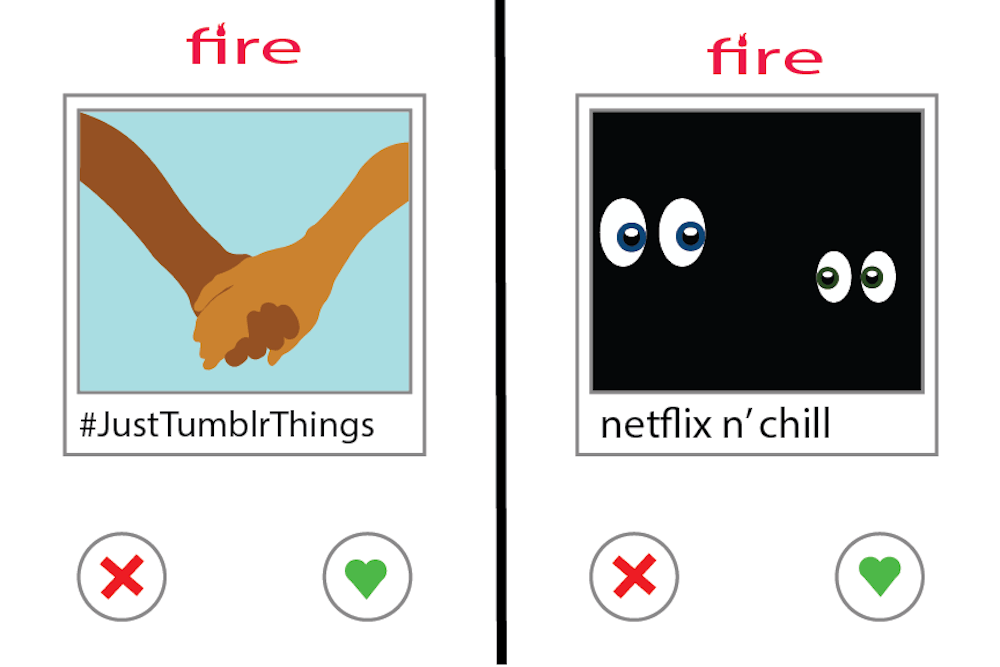In college, it seems like everyone adheres to relationship stereotypes — being in a serious, long-term relationship or casually dating and hooking up.
Short-lived relationships are often seen as insignificant or unsubstantial, while long term ones are more respected and valued. Narrow ideals about relationships invalidate experiences that may not be long-term and serious but are equally significant to a person's growth and development.
By opening ourselves to the idea that any relationship or romantic experience has the potential to be meaningful, we will learn more about ourselves and what experiences will lead to a fulfilling life.
In college, hookups are synonymous with wild nights out. They are often looked at as a mistake or youthful indiscretion, especially in the media. There are a lot of negative attitudes attached to casual dating and hooking up.
“I think hooking up would be okay if both people went into it with the same expectations, but I rarely see that happening,” said Kate Taylor, Match’s dating expert and author of Not Tonight Mr. Right. “Expectations can change over a few hookups — what started as fun could end up feeling more like an audition after a few repeats.”
It is important to carefully consider what kind of dating and relationships feel healthiest and most fulfilling to you. This varies from person to person. Any relationship can be positive as long as we foster an attitude the validates and celebrates each different experience.
Communicating and engaging with someone you may not normally spend time with could open your mind to new ideas. For example, casually dating someone who has a totally different set of values than you do could allow you to consider a new perspective, possibly redefining what a "healthy" relationship is.
Being in these “flings” allows us to share intimate experiences with someone on an accelerated timeline. Walls are broken down much more quickly. We can experience the relationship less anxiety and apprehension because we know there’s no time to hold back.
This is especially true for college students who have limited time for relationships that require significant time and energy. By dating casually students are able to experience relationships while still managing work and school.
Hooking up also allows us to learn about our sexuality. We may have less reservation to ask for what we want because the spontaneity of a hookup can foster authenticity and honesty.
Short term relationships can also highlight what qualities we value in our love-lives. By experiencing different relationships, we gain insight into what we look for in a partner.
“Every kind relationship we enter into has something to teach us. Many of these (relationships) teach us what we value and what we want. They often teach us more about ourselves than about our partners," said Whitney Linscott, managing member of Bracket Dating LLC.
Long term relationships are a lot of work. The more we learn about ourselves and our sexualities, the better prepared we are to commit to long term relationships. Exploration shapes healthy sexualities, self images and attitudes about romantic relationships.
Ultimately, its up to you to decide what kind of relationship and intimacy feels healthiest to you. For some, this may be exclusively long term relationships, and this is totally okay and healthy. However, others may feel fulfilled through short term relationships, which is also totally normal.
By accepting that everyone has a different standards that define our sexual and mental health we can begin to normalize and de-stigmatize flings and hookups.
Reach the columnist at sljorda4@asu.edu or follow @skyjordan4 on Twitter.
Editor’s note: The opinions presented in this column are the author’s and do not imply any endorsement from The State Press or its editors.
Want to join the conversation? Send an email to opiniondesk.statepress@gmail.com. Keep letters under 500 words and be sure to include your university affiliation. Anonymity will not be granted.
Like The State Press on Facebook and follow @statepress on Twitter.




